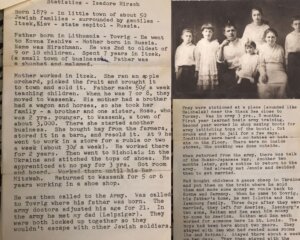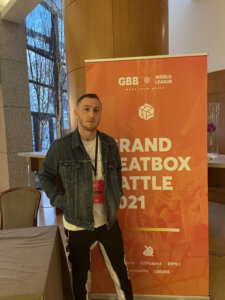The Women’s World Cup led her to take another shot at professional soccer — and brought her back to her Jewish roots
Womens’ soccer has exploded since the last World Cup. The changes brought a once-disillusioned player back to the field

Graphic by Angelie Zaslavsky
Most young athletes would kill for just one chance to play their sport professionally. Jessica Ayers got two.
Ayers, a veteran leader for IFK Kalmar in Sweden and a rare Jew in the ranks of professional footballers, retired in 2016 when it seemed the game had nothing left to offer her, as an immensely talented player who hadn’t quite risen to the level of a world-class star.
As this summer’s Women’s World Cup begins, women’s soccer looks substantially different than it did in 2019, when the U.S. won the title in a tense matchup with the Netherlands. The U.S. women’s team signed a landmark equal pay agreement, a first step toward correcting decades of intense inequality with their male counterparts. European teams have been setting attendance records.
And Ayers, after three years away from her sport, is back on the field, having returned with a new determination to help turn women’s soccer into a sport that can sustain its rank and file players alongside its stars.
The Seattle native has, since her 2019 return, played in the Champions League — a World Cup-style competition between the best clubs in each country on a continent — and helped Kalmar avoid relegation from the top flight of Swedish soccer for the first time in club history. And, in a shock to her and her family, she’s reconnected with her Jewish roots in Europe along the way.
A murky career path
Growing up in Seattle, Ayers “had this idea that it would be really cool to have a career as a professional athlete,” she said in an interview over Zoom. “But it wasn’t very well formed.”
In Europe, the path from prodigy to professional is simple. Talented young athletes start out in academies that are funded by and affiliated with professional clubs, and work their way up the ranks.
In the United States, the path is much trickier.
“When I was growing up,” Ayers explained, “there was always a sense that you have to get a good education, because professional women’s soccer is not a career path.”
Ayers secured an athletic scholarship to attend Colorado College, and earned first-team all-conference honors in Conference USA all four years she played, and second-team all American honors her senior year. (Conference USA is one of 30 conferences in Division I NCAA women’s’ soccer.)
After graduating, she was selected in the third round of the 2015 National Women’s Soccer League draft by Kansas City. But finding a team to stick with proved difficult. She bounced from Kansas City to New York to Seattle before eventually landing in Finland, a league with few players as talented as those in the NWSL.
After four months spent competing in a league she felt wasn’t moving her forward, Ayers had a mid-20s crisis of professional identity: She couldn’t “see a path forward” toward a sustainable career as a soccer player. She didn’t have an agent, or mentors in the game to bounce ideas off of. So she chose to return to that old plan B: a good education.
Out to fix women’s soccer
Ayers applied to MBA programs, focusing her applications on the disparity between public interest in womens’ soccer and the investment in the game.
“An estimated 25.4 million people watched the 2015 Women’s World Cup final — making it the most-watched soccer event in U.S. television history,” she wrote in one essay. “The 2015 Stanley Cup final attracted 7.6 million viewers. So why does our women’s soccer league struggle to pay the bills while the NHL adds teams and builds expensive new arenas?”
Ayers cherished dreams of using her degree to work toward building a more effective business model for womens’ soccer, working after her graduation as a consultant with Deloitte. But when the 2019 World Cup came around, she realized she wasn’t quite as ready to shift her focus as she’d thought.
She couldn’t watch the matches, she told Goal: “It was too upsetting to me because I missed playing football so much.”
Yes, it was risky to “turn down a good job that has an upward trajectory for something that pays next to nothing.” But she called on former colleagues, signed with an agent, and made a plan to return to football — with a plan to, whenever she decides to hang up her cleats for good, resume her quest to fix womens’ football on the management side of a club or professional league.
As it turns out, that return to professional roots would reconnect her with her Jewish roots as well.
A pair of rediscoveries
A short spell at IK Myran, a Finnish club where Ayers had played before her retirement, led to 18 months with Lithuanian champions FC Gintra-Universitetas, who also play in the Champions League.
For Ayers’ family, the move to Lithuania was also a chance to revisit their past.
Ayers’ great-great grandfather, Isadore Hirsch, escaped Lithuania in the face of Tsarist Russian conscription and antisemitism ‚ a history about which Ayers had no idea until she signed her contract to play there.
“My grandmother was so excited,” said Ayers. “She dug up a history project that she had done in school about her grandfather, and that’s how I came to find out about it.”

Ayers began spending her days off visiting sites with Jewish significance in Lithuania. Many were mass graves. Some, she wasn’t even looking for: In her own neighborhood, she came across a plaque that said, “this area is a former Jewish ghetto.”
Eventually, she moved to Sweden, and to IFC Kalmar. And while she isn’t making an appearance at this summer’s World Cup, she is taking the occasion of women’s soccer’s highest-profile event to reflect on the long path she’s taken to find a career that, at least for now, feels stable.
Kalmar’s sporting director Tommy Nyberg cited Ayers as a key reason Kalmar was able to avoid relegation from Sweden’s top division for the first time in club history. And Ayers is enjoying free time she didn’t have as a consultant.
In that job, Ayers “didn’t have time to pick up the phone and call Bubbe or Zeida,” she said. But as a soccer player, “you can’t train eight hours a day. That extra time gives you the ability to dig into things that matter to you.”
“So for me, one of those things was my family heritage and connecting to that, and talking to my living family about their grandparents.”
Now at Kalmar, Ayers is further from her family history, but she did get to share a brief Jewish experience in Sweden.
Rebecca Cameras, a Jewish descendant of Holocaust survivors who escaped to Sweden, was part of the Kalmar squad before transferring to another club. When she and Ayers discovered their shared heritage, Ayers said it was “so exciting.”
“We thought, ‘Oh, my God, we have to have Passover together.’ Because it’s not something you find very often.”
















